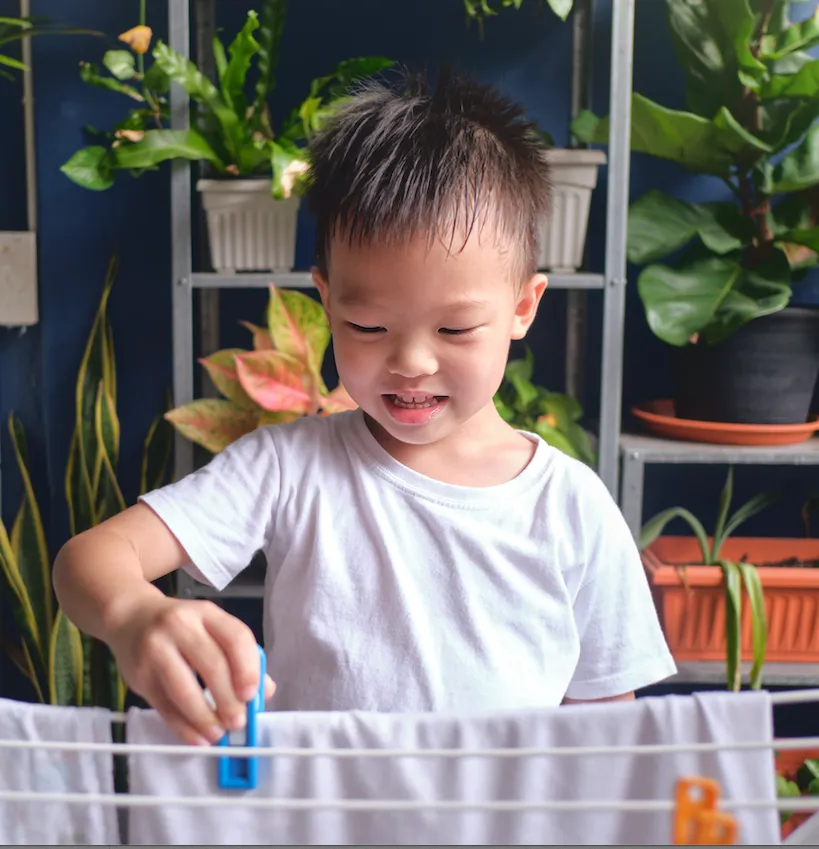
The Importance of Giving a Child Chore
Mindful delegation of chores to your preschooler helps them build confidence, responsibility and time management skills.
Most parents assign their children chores. These choices are often small items that are not critical to getting the household run correctly, but they do help the child be prepared for their day. Great choices for preschoolers include taking their dishes into the kitchen and placing them by the dishwasher after a meal or snack, picking up after themselves, putting a toy or game away before starting to play with a new one or having a set, organized series of things to do with their belongings when they return home from school.
Sometimes children can struggle with completing their chores. They become distracted, defiant or ignore you. The chore doesn’t get done. If you repeat this pattern, many parents may stop asking their child to do these chores, either believing that they are too young for the responsibility or because they are tired of reminding the child.
All children are periodically defiant. All children have moments of overwhelm. But when a child acts out, raising their voice or throwing objects,, that behavior can trigger a parent’s own anxiety and nervous system.
Calmer children make for calmer parents. Calmer parents make for calmer children. Studies have shown that when two people known to each other are in a room, their nervous systems help their bodies co-regulate. The heart and respiratory rates slowly and involuntarily match. So, helping your preschooler helps the whole family.
Great things happen when you give a small child autonomy and responsibility over an activity. These include:
By thinking about the chore and then doing it themselves, it gives them an opportunity to mirror their parents and learn new skills.
Assigning chores gives the parent an opportunity to affirm to the child that the child's behavior is good, which is incredibly important to a child.
Completing an assigned task gives the child an opportunity to feel like they have control over their environment.
All of these things help build the child's sense of confidence, self, and autonomy, which helps children learn at school and behave more comfortably in social settings. It makes the household less anxious.
Yet, that initial moment of defining a chore and assigning it can be stressful for the parent and confusing for the child, especially if the chore is completely new to them.
Here are five tips to make assigning chores to your preschooler easier.
Some of the tips may feel contradictory but keep in mind that the pattern of clearly setting a rule with the child and then enforcing it in ways that reinforce the boundary will help your child build autonomy.
Assign tasks clearly. Tell the child exactly what they are to do and how it is to be done. Children are inclined to black-and-white thinking. Demonstrate a chore and describe how it is to be done. That sets the rule. Then have the child explain to you how a task that is their responsibility should be done, as if they were in charge. This gives them autonomy over their chore and makes the responsibility their own. Do the Toucan BrainMove or other movements that help with concentration to help your child get the words and ideas in the right order.
Balance direct requests with indirect reminders. Set the boundary clearly and with no ambiguity, “Jane, when you come home, please take off your shoes and place them on the mat.” But later, when you see her come in, make a comment to help develop the habit with autonomy: “Jane, how many shoes are on the mat?” or “Jane, do you think your shoes need to be put in a straight line when you put them on the mat?”
Use a calm voice and a calm tone, even when making a corrective comment. Even if the child has annoyed you, remember that your child may stop listening to you if you raise your voice. You can gently correct your preschooler by saying something like, “I noticed that you didn’t put your shoes on the mat. Would you like me to show you how to do it again?” or “I noticed you didn’t put your shoes on the mat. You did a good job with it the last two days. Please go back and do it the way you are supposed to. Thank you!”
Remember to say “please” and “thank you.”
Your child will learn respect and to be polite when the whole family says “please” and “thank you.” It isn’t nice to give orders to anyone and a lot of people react negatively.when they are told what to do or stop listening. Even though it is your child’s responsibility to do a chore, it is better to ask than to tell.
Acknowledge your child’s accomplishment with positive noticing.
Children generally do better with positive attention than negative attention. They are more likely to continue doing their chores if you notice and give them positive feedback.
Give time to process. Learn your child's “thinking face” and make sure you understand how long they need to think through and answer when you ask a question—especially if they are overstimulated. Doing a BrainMove like the Koala Cub can help the child listen and communicate their thoughts more clearly and calmly.
Be mindful of sensory overload and create a calm environment. Not every environment your child will be in is going to be spa-like and quiet, so it's important to make sure that the child has a quiet, secure place to reset their brain. If your child comes home from a school day hyperactive, suggest some transition BrainMoves movements. The Duckling is a great movement for little bodies that are hyperactive.
Why are assigned chores so important to children, even young ones like preschoolers?

Teaching preschoolers how to work inside boundaries and do activities independently helps them define their own boundaries as they grow. Doing chores with their parents' positive feedback improves a child’s autonomy.
Being able to plan, start, and finish even simple chores improves executive functioning skills and helps preschoolers be successful students. Using BrainMoves to help transition between tasks and activities can smooth the way to a calmer, more peaceful and maybe even a bit more organized home.

